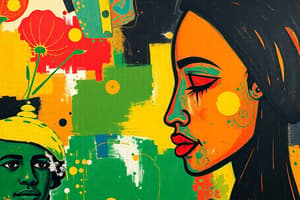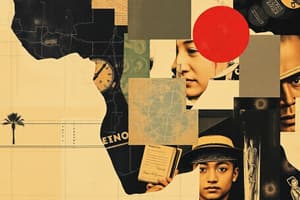Podcast
Questions and Answers
According to the provided text, what is a core concern of post-colonialism?
According to the provided text, what is a core concern of post-colonialism?
The text suggests that a core concern of post-colonialism is the reconstruction of the present by interrogating the past.
What does the text suggest about the relationship between colonial powers and literature?
What does the text suggest about the relationship between colonial powers and literature?
The text implies that colonial powers actively used literature to suppress indigenous cultures and replace them with their own.
How does the text describe the nature of post-colonial literatures?
How does the text describe the nature of post-colonial literatures?
The text describes post-colonial literatures as works that strategically engage with history and culture to counter colonial narratives.
What is the significance of post-colonialism as a 'strategic methodology' according to the text?
What is the significance of post-colonialism as a 'strategic methodology' according to the text?
Identify one specific historical example mentioned in the text that illustrates the suppression of indigenous literatures by colonial powers.
Identify one specific historical example mentioned in the text that illustrates the suppression of indigenous literatures by colonial powers.
How does the text connect the study of post-colonialism to contemporary societies?
How does the text connect the study of post-colonialism to contemporary societies?
What are some of the potential benefits for those whose stories and histories have been suppressed, as described in the text, by engaging with post-colonialism?
What are some of the potential benefits for those whose stories and histories have been suppressed, as described in the text, by engaging with post-colonialism?
What role does literary imagination play in post-colonialism?
What role does literary imagination play in post-colonialism?
How does Chinua Achebe's work demonstrate cultural identity and nationalism?
How does Chinua Achebe's work demonstrate cultural identity and nationalism?
What is the central argument of the provided text regarding the post-colonial experience?
What is the central argument of the provided text regarding the post-colonial experience?
What is the significance of the novel, Fearless of Ifeoma Chinwuba, in relation to the text's argument?
What is the significance of the novel, Fearless of Ifeoma Chinwuba, in relation to the text's argument?
What are some of the post-colonial discourse elements used to analyze the text Fearless of Ifeoma Chinwuba?
What are some of the post-colonial discourse elements used to analyze the text Fearless of Ifeoma Chinwuba?
What specific aspect of Achebe's writing is highlighted by Charles Nnolim's statement?
What specific aspect of Achebe's writing is highlighted by Charles Nnolim's statement?
How does the colonial process affect colonized people?
How does the colonial process affect colonized people?
What is the central concept the text emphasizes for recovering from colonialism?
What is the central concept the text emphasizes for recovering from colonialism?
Specifically, what does the text say about the role of Western ideologies in recovering from colonialism?
Specifically, what does the text say about the role of Western ideologies in recovering from colonialism?
According to Ashcroft et al., what does the term "appropriation" refer to in the context of postcolonial literature?
According to Ashcroft et al., what does the term "appropriation" refer to in the context of postcolonial literature?
Why do postcolonial writers like Ifeoma Chinwuba attach such importance to the question of cultural identity?
Why do postcolonial writers like Ifeoma Chinwuba attach such importance to the question of cultural identity?
How does Chinua Achebe's perspective on the use of English language in African literature align with Ashcroft et al.'s definition of appropriation?
How does Chinua Achebe's perspective on the use of English language in African literature align with Ashcroft et al.'s definition of appropriation?
What does the excerpt suggest is a key aspect of understanding a literary work, particularly in a postcolonial context?
What does the excerpt suggest is a key aspect of understanding a literary work, particularly in a postcolonial context?
What is the main argument presented in the excerpt regarding the importance of understanding a literary work's context?
What is the main argument presented in the excerpt regarding the importance of understanding a literary work's context?
What kind of impact does colonial history have on the cultural identity of a nation, according to the excerpt?
What kind of impact does colonial history have on the cultural identity of a nation, according to the excerpt?
How do postcolonial writers challenge the traditional understanding of the English language?
How do postcolonial writers challenge the traditional understanding of the English language?
What is the key message about cultural identity that the excerpt conveys?
What is the key message about cultural identity that the excerpt conveys?
Explain how the author's portrayal of society in the given text challenges stereotypical representations of African cultures.
Explain how the author's portrayal of society in the given text challenges stereotypical representations of African cultures.
What is the significance of the quote, "He going to bathe in the stream.You want follow him?" (57) in relation to the author's use of pidgin English?
What is the significance of the quote, "He going to bathe in the stream.You want follow him?" (57) in relation to the author's use of pidgin English?
Identify two specific elements from the text that demonstrate the indoctrination given to the children and its purpose.
Identify two specific elements from the text that demonstrate the indoctrination given to the children and its purpose.
What is the symbolic significance of the kola nut in the text and how does it relate to African traditions?
What is the symbolic significance of the kola nut in the text and how does it relate to African traditions?
According to the passage, what is the significance of the pouring of libation in the context of African culture?
According to the passage, what is the significance of the pouring of libation in the context of African culture?
How does the author's use of pidgin English challenge the notion of Queen's English as the standard language of authority?
How does the author's use of pidgin English challenge the notion of Queen's English as the standard language of authority?
How does the author's portrayal of the boy's experience in Umudo challenge the stereotypical depiction of Africa as a primitive and underdeveloped land?
How does the author's portrayal of the boy's experience in Umudo challenge the stereotypical depiction of Africa as a primitive and underdeveloped land?
Based on the provided text, what are the author's main intentions in portraying African culture and society?
Based on the provided text, what are the author's main intentions in portraying African culture and society?
What is a significant aspect of African culture that is highlighted through Chinwuba's narration of Ralph's experience with fufu, specifically focusing on its importance to the Igbo people?
What is a significant aspect of African culture that is highlighted through Chinwuba's narration of Ralph's experience with fufu, specifically focusing on its importance to the Igbo people?
What is the literary technique used by Chinwuba to represent the African context, offering a glimpse into the Igbo language and culture?
What is the literary technique used by Chinwuba to represent the African context, offering a glimpse into the Igbo language and culture?
Describe one of the untranslated Igbo words mentioned in the text, its English translation, and its cultural significance.
Describe one of the untranslated Igbo words mentioned in the text, its English translation, and its cultural significance.
According to the passage, what does Matt's surprise at his son's recovery in Africa reveal about Ralph's adaptation process? How does this relate to the broader theme of cultural adaptation?
According to the passage, what does Matt's surprise at his son's recovery in Africa reveal about Ralph's adaptation process? How does this relate to the broader theme of cultural adaptation?
How do proverbs contribute to African cultural identity and value according to the text?
How do proverbs contribute to African cultural identity and value according to the text?
Identify at least one specific untranslated word or expression from the Igbo language that Chinwuba utilizes in her story. What is its English translation and what does it convey about the Igbo cultural context?
Identify at least one specific untranslated word or expression from the Igbo language that Chinwuba utilizes in her story. What is its English translation and what does it convey about the Igbo cultural context?
What is one potential consequence if indigenous literatures are suppressed by colonial powers, using the examples provided in the text?
What is one potential consequence if indigenous literatures are suppressed by colonial powers, using the examples provided in the text?
What does the proverb, “you eati pepper, you will yellow more, more”, suggest about the speaker's perspective towards the colonial order?
What does the proverb, “you eati pepper, you will yellow more, more”, suggest about the speaker's perspective towards the colonial order?
How does the phrase “Thank your gods that it is rice that Uwa cook today” reveal the impact of colonialism on daily life?
How does the phrase “Thank your gods that it is rice that Uwa cook today” reveal the impact of colonialism on daily life?
What does the exchange between Phoebe and Ralph, regarding African herbs, suggest about their beliefs and the colonial context?
What does the exchange between Phoebe and Ralph, regarding African herbs, suggest about their beliefs and the colonial context?
How might the phrase “Junior go late for school, get cane for back” depict the impact of colonial education on indigenous communities?
How might the phrase “Junior go late for school, get cane for back” depict the impact of colonial education on indigenous communities?
What does Ralph's internal journey to London signify in the context of the provided passage?
What does Ralph's internal journey to London signify in the context of the provided passage?
How does the phrase “I think you want eat for white man house. Eat, let us see” reflect the power dynamics and social hierarchy prevalent during the colonial era?
How does the phrase “I think you want eat for white man house. Eat, let us see” reflect the power dynamics and social hierarchy prevalent during the colonial era?
Analyze the significance of the phrase “Small master no go school?” in relation to the themes of education and inequality in the colonial context.
Analyze the significance of the phrase “Small master no go school?” in relation to the themes of education and inequality in the colonial context.
How does the excerpt showcase the tension between traditional African practices and those imposed by the colonial regime?
How does the excerpt showcase the tension between traditional African practices and those imposed by the colonial regime?
Flashcards
Post-colonial theory
Post-colonial theory
A framework used to analyze the effects of colonization on cultures.
Chinua Achebe
Chinua Achebe
A prominent Nigerian writer known for exploring cultural identity.
Cultural identity
Cultural identity
The sense of belonging to a particular culture.
Hybridity
Hybridity
Signup and view all the flashcards
Cultural nationalism
Cultural nationalism
Signup and view all the flashcards
Appropriation
Appropriation
Signup and view all the flashcards
Abrogation
Abrogation
Signup and view all the flashcards
Cultural assertion
Cultural assertion
Signup and view all the flashcards
Post-colonialism
Post-colonialism
Signup and view all the flashcards
Kirsti Bohata
Kirsti Bohata
Signup and view all the flashcards
Indigenous Literatures
Indigenous Literatures
Signup and view all the flashcards
Canonical European Literature
Canonical European Literature
Signup and view all the flashcards
Literary Washout
Literary Washout
Signup and view all the flashcards
Homi Bhabha
Homi Bhabha
Signup and view all the flashcards
Cultural Imagination
Cultural Imagination
Signup and view all the flashcards
Suppressive Narratives
Suppressive Narratives
Signup and view all the flashcards
African herbs
African herbs
Signup and view all the flashcards
Phoebe's determination
Phoebe's determination
Signup and view all the flashcards
Oral tradition
Oral tradition
Signup and view all the flashcards
Ralph's mission
Ralph's mission
Signup and view all the flashcards
Cane for back
Cane for back
Signup and view all the flashcards
Cultural context
Cultural context
Signup and view all the flashcards
Medicine men
Medicine men
Signup and view all the flashcards
Daily chores
Daily chores
Signup and view all the flashcards
Libation
Libation
Signup and view all the flashcards
Kola Nut
Kola Nut
Signup and view all the flashcards
Pidgin English
Pidgin English
Signup and view all the flashcards
Urban working class
Urban working class
Signup and view all the flashcards
Rural working class
Rural working class
Signup and view all the flashcards
Cultural expression
Cultural expression
Signup and view all the flashcards
Colonial contact
Colonial contact
Signup and view all the flashcards
Social context
Social context
Signup and view all the flashcards
Cultural gridlock
Cultural gridlock
Signup and view all the flashcards
Principle of appropriation
Principle of appropriation
Signup and view all the flashcards
New English
New English
Signup and view all the flashcards
Cultural texture
Cultural texture
Signup and view all the flashcards
Historical moment
Historical moment
Signup and view all the flashcards
Conditions of publication
Conditions of publication
Signup and view all the flashcards
Values drawn upon
Values drawn upon
Signup and view all the flashcards
Presumed background
Presumed background
Signup and view all the flashcards
Fufu
Fufu
Signup and view all the flashcards
Ralph's Adaptation
Ralph's Adaptation
Signup and view all the flashcards
Untranslated Expressions
Untranslated Expressions
Signup and view all the flashcards
Igbo Culture
Igbo Culture
Signup and view all the flashcards
Proverbs in African Culture
Proverbs in African Culture
Signup and view all the flashcards
Coughing Incident
Coughing Incident
Signup and view all the flashcards
Omenma
Omenma
Signup and view all the flashcards
Cultural Artifacts
Cultural Artifacts
Signup and view all the flashcards
Study Notes
Course Information
- Tutorial: African Literature
- Semester: 1
- Level: Undergraduate - Licence 2
- Number of hours: 12 hours
Course Instructor
- Dr. [Name removed]
- Assistant Professor of African Literature and Civilisation
- Email: [Email removed]
- Phone Number: [Phone number removed]
- Office Hours: By appointment
Description
- The tutorial focuses on Ifeoma Chinwuba's novel, Fearless (2004).
- The novel follows Ralph, a white boy who falls ill in London.
- His father moves the family to Africa to improve his health.
- The novel is divided into three parts:
- Part 1: Ralph's arrival in Umudo and his initiation into adulthood.
- Part 2: Ralph's initiation ceremonies on Snake Island.
- Part 3: Ralph's journey back to London to treat his mother.
Objectives and Expected Outcome
- Students will be able to write essays on trends in African literature, illustrating their viewpoints with African literary works.
- Students will be able to identify and analyze major themes in Fearless (2004).
Mode of Delivery
- Reading
- Essay writing
- Group discussion
Class Assessment
- Multiple choice questions
- Essay writing
- Oral presentations
Bibliography
- Chinwuba, I. (2004). Fearless. London: The Book Guild Ltd.
- Ukande, C. K. (2016). Culture as the Bedrock of a People's Identity: An Exploration of Ifeoma Chinwuba's Fearless. Global Journal of Human-Social Science: C (Sociology & Culture), 16(2), 23-28.
Tutorial 1: Test 1 - Chinwuba's Fearless
- Contains questions regarding definitions of African Literature, colonial writing, lists of African writers, and information on the author of "Heart of Darkness."
- Includes questions about authors and titles of literary works.
An Overview of Ifeoma Chinwuba's Fearless (B-Brainstorming)
- Questions about author Ifeoma Chinwuba, her writing generation, number of published books, and summary of Fearless.
Study the Following Constituent Elements of Fiction in Fearless
- Setting: The social context in which the novel's events occur, including location, time period, and culture.
- Characters: Round vs Flat, Protagonist and Antagonist. Distinction between flat and round characters and how the characters change within the narrative. Who is the protagonist and antagonist?
- Plot: Events, cause and effect. The series of events within the narrative.
Tutorial 2: Writing a Literary Commentary (Guidelines)
- Commentary is analysis of a passage; not an essay
- Commentary should focus on themes/styles of the passage.
- Include line numbers of analyzed text
- Avoid general statements; focus on the specifics of passage
- Use a structure for commentary (introduction, overview, detailed analysis, and conclusion).
Tutorial 3: Writing a Literary Essay
- Presents essay assignment prompts regarding various aspects of Ifeoma Chinwuba's novel Fearless.
Studying That Suits You
Use AI to generate personalized quizzes and flashcards to suit your learning preferences.




